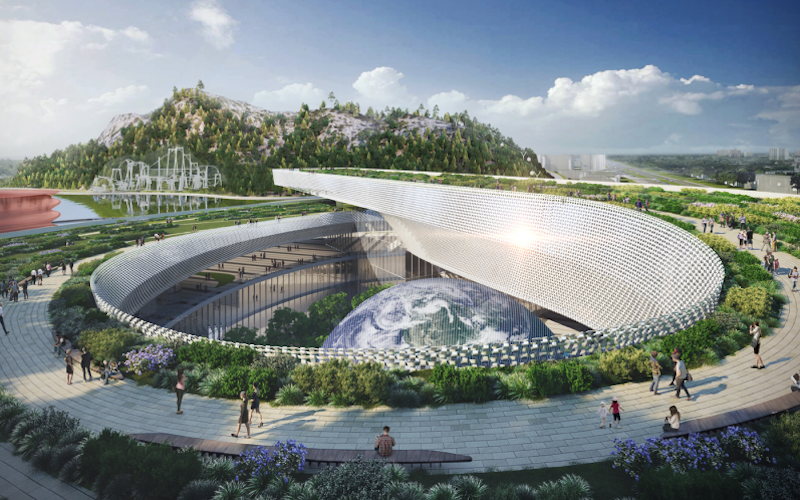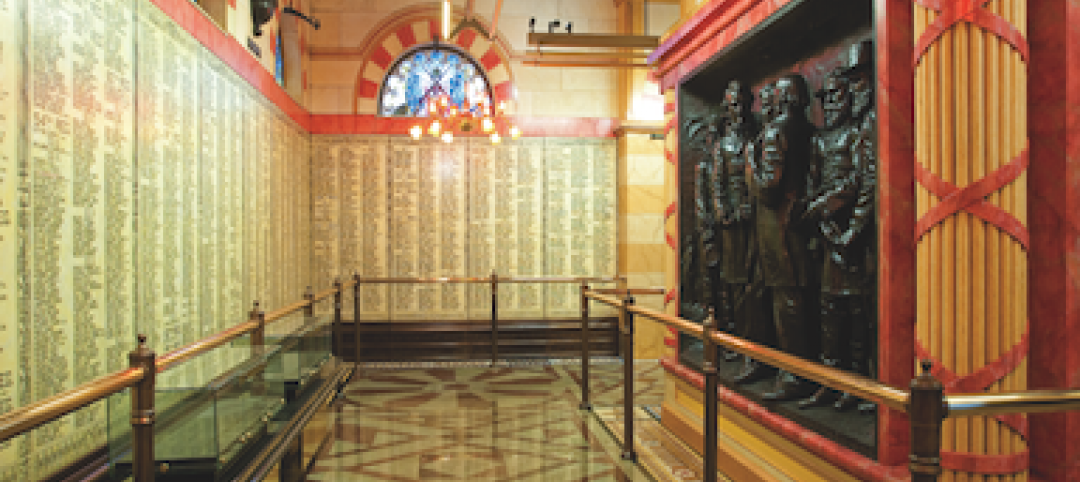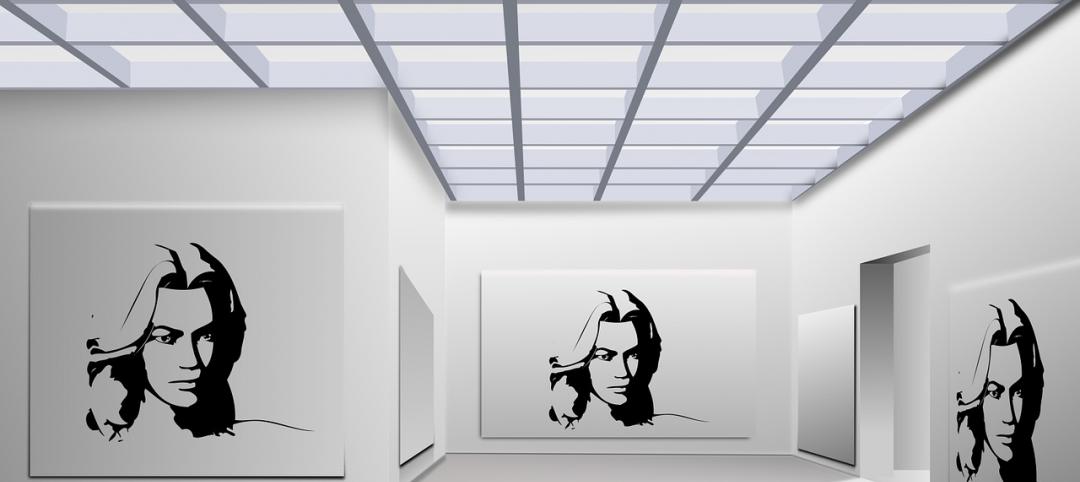Shan shui is a Chinese expression that, roughly translated, means the union of mountain and lake. It is this phrase that proved to be the inspiration for the new Suzhou Science & Technology Museum designed by Perkins+Will.
The museum will become the new centerpiece of a new cultural district in Shishan Park, located about 62 miles northwest of Shanghai. The museum sits at the foot of Lion Mountain and next to Shishan Lake (hence the shan shui inspiration) and will encompass 600,000 sf of space. Included in this space is a 66,700-sf industrial exhibition hall, where exhibits will highlight the role of industrial development.
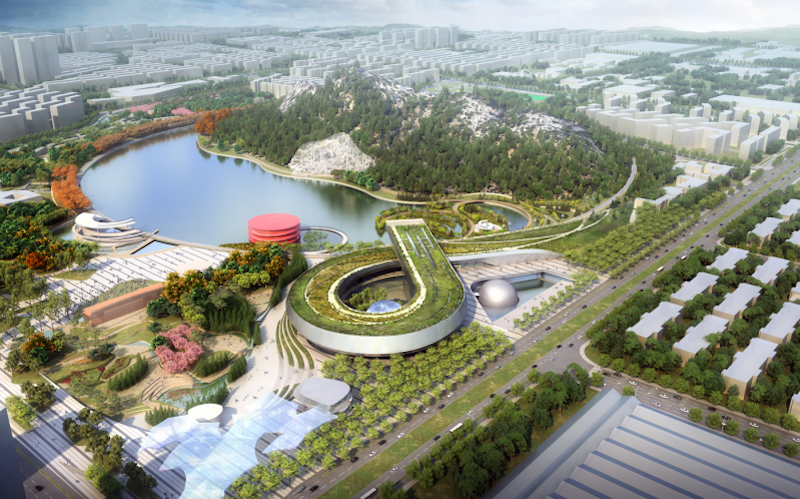 Rendering courtesy of Perkins+Will.
Rendering courtesy of Perkins+Will.
The ribbon-like form of the museum emerges from the base of Lion Mountain and twists upward before it turns back on itself to cantilever out over the edge of Shishan Lake. Several man-made, teardrop-shaped, planted Eco Islands will stipple the lake. These islands will act as a filtration system and be connected by a walkway to the museum.
Visitors can arrive at the museum from several approaches. Those arriving by subway will be guided into the museum along a shallow ramp to the circular promenade that surrounds the park. Those coming by car or bus will enter through a formal plaza with reflecting pools and gathering spaces dubbed the “Discovery Court.”
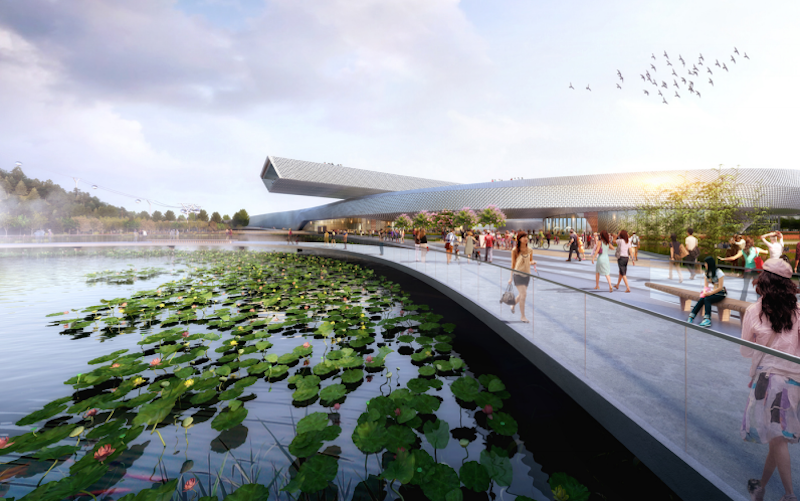 Rendering courtesy of Perkins+Will.
Rendering courtesy of Perkins+Will.
Once visitors enter the museum, via whichever approach they desire, they will be greeted by a three-story atrium adjacent to a sunken water-filled courtyard that includes several small planted islands meant to reflect the Eco Islands in Shishan Lake.
Each level within the museum has access to natural daylight. The museum’s third level comprises “Lion Mountain Terrace,” which stretches out over the Eco Islands and frames Lion Mountain in the distance. This isn’t the only way the museum highlights sustainability and the environment, though.
A “Life-Giving Forest” outside the museum provides an air filtration buffer to the city and a unique place for outdoor exhibits. Public pedestrian walkways where the museum meets the lake wind through the Eco Islands and the wetlands with signage that guide guests to explore water purification, storm water management, and sustainable living.
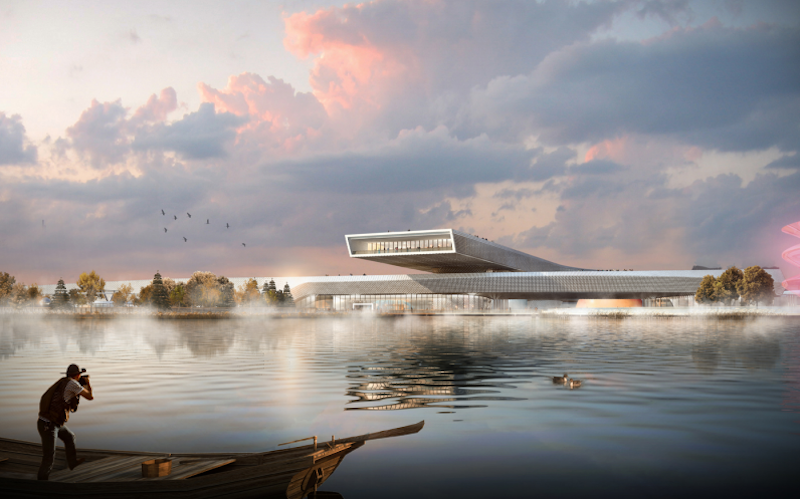 Rendering courtesy of Perkins+Will.
Rendering courtesy of Perkins+Will.
A 3D metal mesh skin transitions from opaque to transparent to control daylight and solar gain and permeable paving systems and bioswales allow rain water to percolate directly into the ground of be directed toward the planted vegetation to be filtered naturally. Additionally, the construction of wetlands and Eco Islands will improve the water quality of Shishan Lake and make it a healthier habitat for wildlife and visitors.
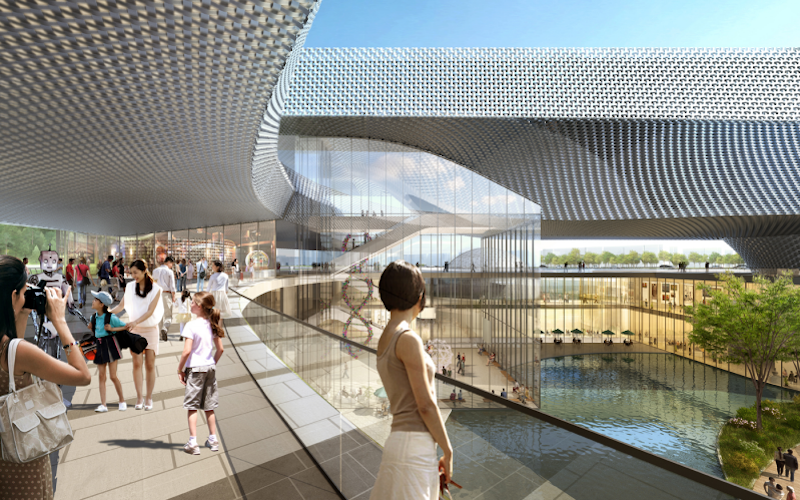 Rendering courtesy of Perkins+Will.
Rendering courtesy of Perkins+Will.
“Our design recognizes the importance of Suzhou in China’s commercial history, and underscores its role at the forefront of China’s emergence as a technology leader and innovator,” says Ralph Johnson, Global Design Director of Perkins+Will.
Perkins+Will previous design work in China includes the Shanghai Natural History Museum, which opened in 2015.
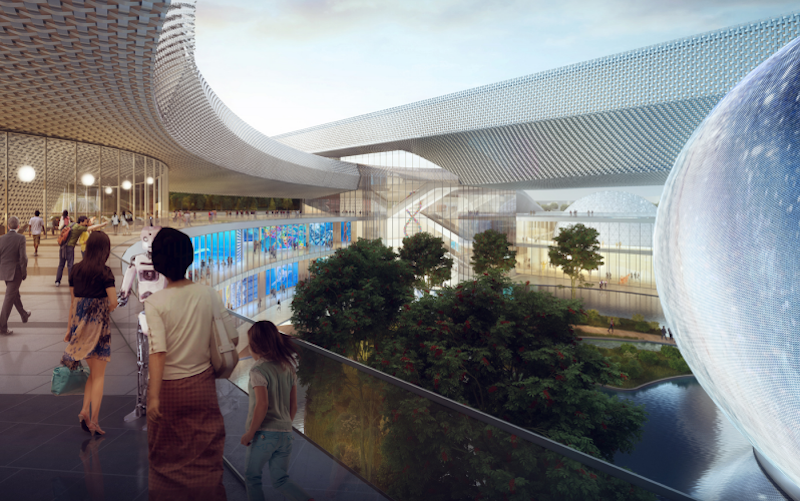 Rendering courtesy of Perkins+Will.
Rendering courtesy of Perkins+Will.
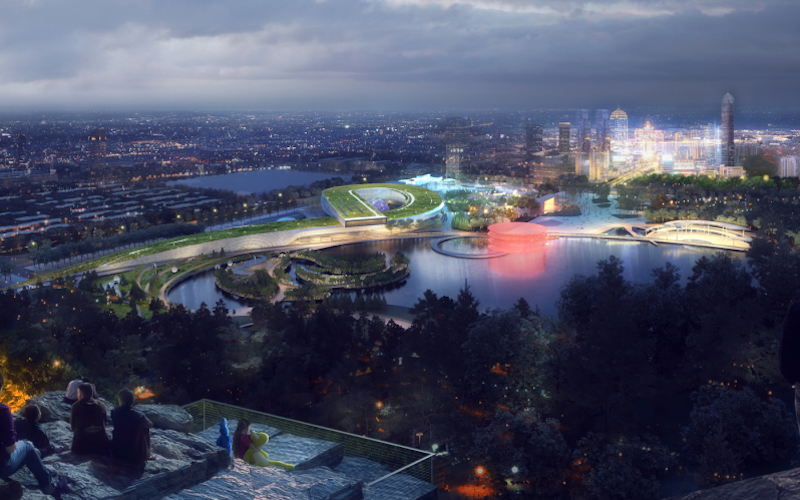 Rendering courtesy of Perkins+Will.
Rendering courtesy of Perkins+Will.
Related Stories
| Oct 12, 2010
Cuyahoga County Soldiers’ and Sailors’ Monument, Cleveland, Ohio
27th Annual Reconstruction Awards—Gold Award. The Cuyahoga County Soldiers’ and Sailors’ Monument was dedicated on the Fourth of July, 1894, to honor the memory of the more than 9,000 Cuyahoga County veterans of the Civil War.
| Aug 11, 2010
JE Dunn, Balfour Beatty among country's biggest institutional building contractors, according to BD+C's Giants 300 report
A ranking of the Top 50 Institutional Contractors based on Building Design+Construction's 2009 Giants 300 survey. For more Giants 300 rankings, visit http://www.BDCnetwork.com/Giants
| Aug 11, 2010
Jacobs, Arup, AECOM top BD+C's ranking of the nation's 75 largest international design firms
A ranking of the Top 75 International Design Firms based on Building Design+Construction's 2009 Giants 300 survey. For more Giants 300 rankings, visit http://www.BDCnetwork.com/Giants
| Aug 11, 2010
Walter P Moore wins top award for Nerman Museum of Contemporary Art
With structural engineering from Walter P Moore, Nerman Museum of Contemporary Art has won the New Buildings Under $30 Million project category in the 2009 Structural Engineers Association of Kansas & Missouri (SEAKM) Awards Program.
| Aug 11, 2010
Thom Mayne unveils 'floating cube' design for the Perot Museum of Nature and Science in Dallas
Calling it a “living educational tool featuring architecture inspired by nature and science,” Pritzker Prize Laureate Thom Mayne and leaders from the Museum of Nature & Science unveiled the schematic designs and building model for the Perot Museum of Nature & Science at Victory Park. Groundbreaking on the approximately $185 million project will be held later this fall, and the Museum is expected to open by early 2013.
| Aug 11, 2010
Rafael Vinoly-designed East Wing opens at Cleveland Museum of Art
Rafael Vinoly Architects has designed the new East Wing at the Cleveland Museum of Art (CMA), Ohio, which opened to the public on June 27, 2009. Its completion marks the opening of the first of three planned wings.
| Aug 11, 2010
Girl Scouts of San Jacinto Council Program Place Project
Houston, Texas
The Girl Scouts of San Jacinto Council Program Place is the headquarters for the largest Girl Scout Council in the U.S., with 63,000 scouts. The building houses the council’s administrative offices, a Girl Scout museum, and activity space. When an adjacent two-story office building became available, the council jumped at the chance to expand its museum and program space.
| Aug 11, 2010
Jacobs, HDR top BD+C's ranking of the nation's 100 largest institutional building design firms
A ranking of the Top 100 Institutional Design Firms based on Building Design+Construction's 2009 Giants 300 survey. For more Giants 300 rankings, visit http://www.BDCnetwork.com/Giants
Museums | Aug 11, 2010
Design guidelines for museums, archives, and art storage facilities
This column diagnoses the three most common moisture challenges with museums, archives, and art storage facilities and provides design guidance on how to avoid them.


